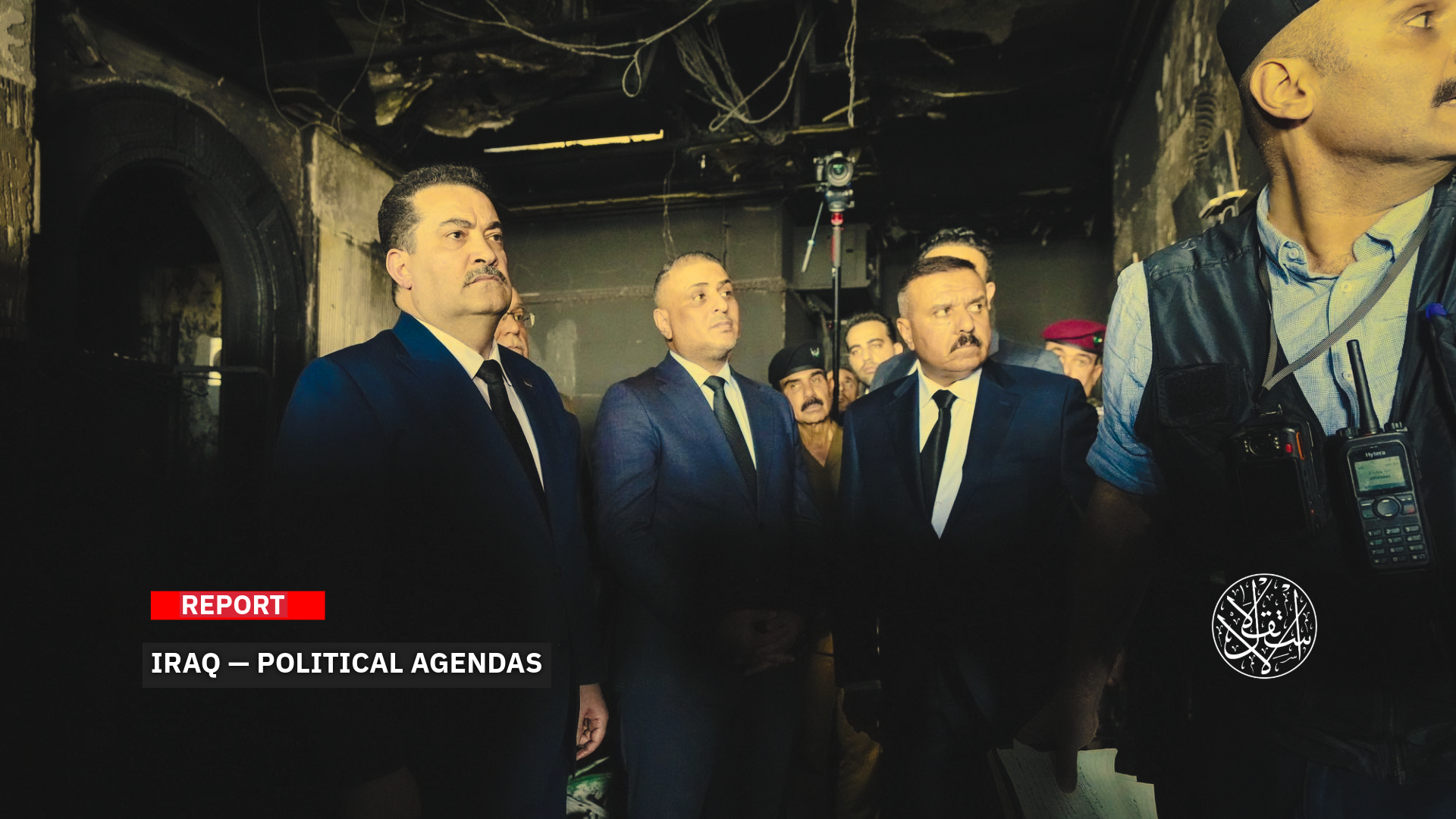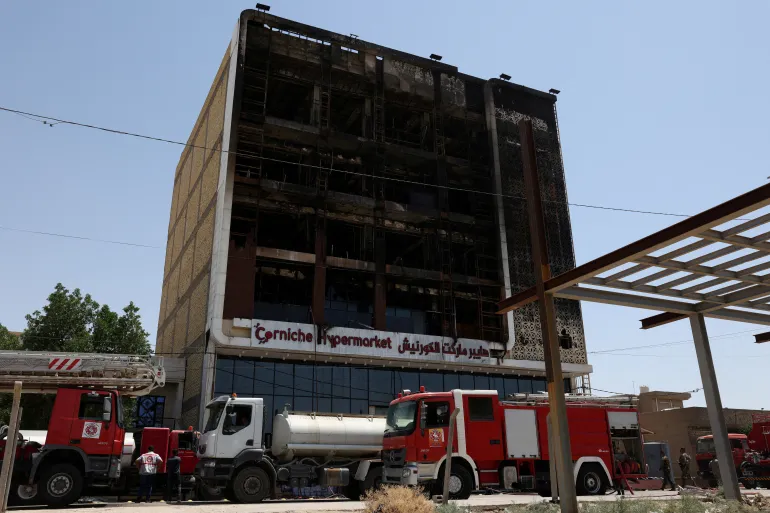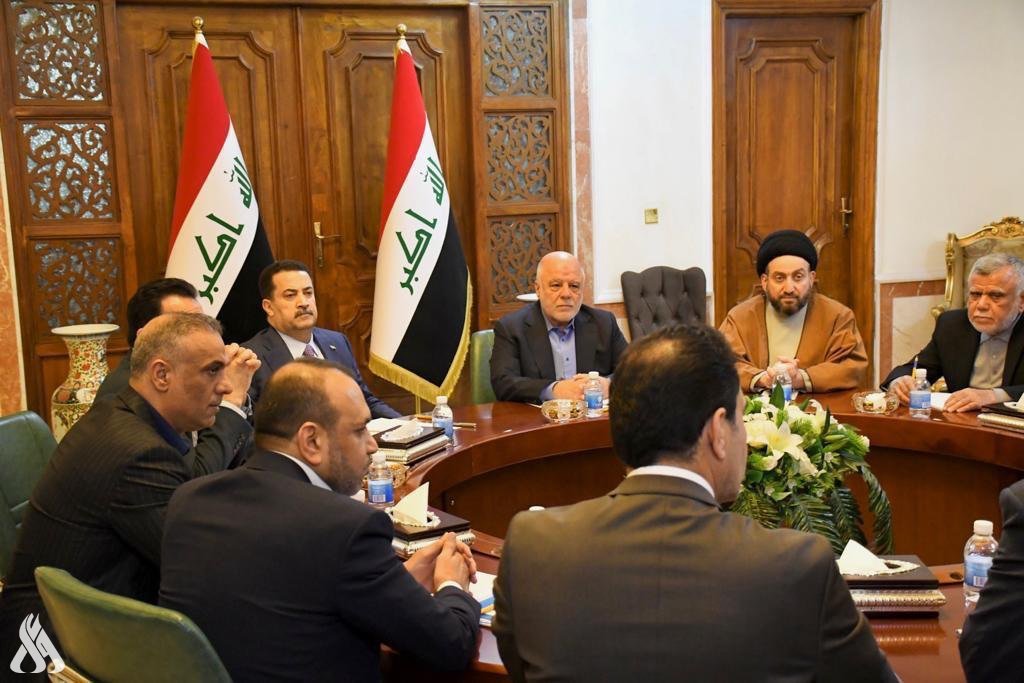Al-Sudani Was the Target: How Iraq's Mall Fire Is Being Politicized Ahead of Elections

“It’s no surprise they’d turn a tragedy into a political weapon to topple the prime minister or others.”
As Iraq’s parliamentary elections draw closer, political factions are stepping up their media campaigns, using crises and incidents to discredit rivals, even at the cost of civilian lives. This reflects the ongoing power struggle among the ruling Shiite parties.
The elections, set for November 11, 2025, will see most Shiite groups competing for control of the next government, except for the Sadrist Movement, which has announced a boycott. Many expect a major shift in the political landscape.

The Kut Tragedy
The recent fire in the city of Kut is the latest incident exploited by Shiite political factions to target Prime Minister Mohammed Shia’ al-Sudani, who is running in the upcoming elections at the head of a major list. However, the governor of Wasit, Mohammed al-Mayahy, became the scapegoat for the disaster, which claimed over 60 lives.
On July 16, 2025, a fire broke out in a five-story commercial building in central Kut, the capital of Wasit province. It killed 63 people and injured around 40 others, most of them critically. Most victims died from smoke inhalation, as the building had no emergency exits.
Following the incident, al-Mayahy resigned on July 23. The provincial council quickly accepted his resignation and voted to appoint Hadi Majid Kazar to succeed him.
Al-Mayahy had won a sweeping victory in the October 10, 2024 provincial elections, posing a threat to the ruling Shiite Coordination Framework. Coming from outside that bloc, he was expected to win a large share of the vote in the upcoming parliamentary elections.
A day before stepping down, al-Mayahy appeared in a televised interview, suggesting the fire may have been deliberate. He accused factions within the Coordination Framework, specifically the State of Law Coalition led by Nouri al-Maliki and the al-Hikma National Movement led by Ammar al-Hakim, of stirring public anger against him.
He also revealed that an anti-government bloc offered to clear him of blame if he testified in parliament against al-Sudani, aiming to pin the responsibility on the prime minister.
Shibl al-Zaydi, secretary-general of the al-Imam Ali Brigades (Kata’ib al-Imam Ali) and head of the Khadamat Alliance, launched a sharp attack on the State of Law Coalition and its leader, Nouri al-Maliki, on X after they called for Prime Minister Mohammed Shia' al-Sudani to be held accountable for the Kut fire.
On July 21, al-Zaydi reminded members of the coalition of the fall of Mosul to ISIS in 2014 and the many fires and bombings that occurred during Maliki’s two terms as prime minister from 2006 to 2014.
As leader of the Khadamat Alliance, of which al-Mayahy is a founding member and local leader in Wasit, al-Zaydi stressed that justice must be applied equally, not shaped by political agendas, saying, “Justice doesn’t have two faces. Hypocrisy does.”
Political Exploitation
Commenting on al-Mayahy’s resignation and the political tensions following the Kut fire, Iraqi researcher Baha Addin Barzanji said the incident was politically and electorally exploited, especially by the State of Law Coalition led by Nouri al-Maliki, a key rival of Prime Minister Mohammed Shia’ al-Sudani.
“The Hikma National Movement also used the incident against al-Mayahy, who was once part of their leadership before breaking away to take the governor's post and form an electoral list with Shibl al-Zaydi,” he told Al-Estiklal.
The movement, the researcher said, seized on public anger in Wasit province to push him out.
“Shiite factions have shown they’re ready to use force to grab power and positions, just like in the 2022 showdown between the Coordination Framework and the Sadrists, so it’s no surprise they’d turn a tragedy into a political weapon to topple the prime minister or others,” Barzanji added.
On August 29, 2022, violence broke out in Baghdad’s Green Zone between Sadr’s followers and armed groups linked to the Shiite Coordination Framework. The clashes followed Sadr’s failed attempt to form a majority government, excluding rival Shiite parties. Days later, Sadr called on his supporters to withdraw and announced his retirement from politics, after forcing his bloc, which had won 73 seats in the 2021 elections, to resign from parliament.
Political analyst Shaho al-Qaradaghi also said the clash between Shibl al-Zaydi and the State of Law Coalition reflects deeper political rivalries ahead of the election. Speaking to the Iraqi news outlet Alssaa on July 22, he said al-Zaydi’s direct attack on Maliki highlights growing tensions, suggesting the fire incident is being used to settle political scores and defend al-Mayahy against criticism.
Al-Qaradaghi added that even political allies often stage internal conflicts to rally supporters and serve election goals. While such tactics are deliberate, they also reveal real divisions that could erupt at any moment.
He warned that armed groups and smaller factions within the Shiite camp now control major economic interests, and are increasingly trying to assert influence over the political process, something that is likely to lead to further conflict with traditional Shiite power centers.

Previous Crises
The Kut fire wasn’t the first crisis turned into a political weapon. In the lead-up to the 2018 elections, Iran-backed groups seized on the electricity shortage to fuel public outrage against Prime Minister Haider al-Abadi, derailing his bid for a second term just as it seemed within reach.
When al-Abadi led the government from 2014 to 2018, Sadrist leader Muqtada al-Sadr initially pledged to support his reelection to continue reforms. However, he withdrew support during protests in Basra in July 2017 demanding electricity.
In a December 2018 interview, al-Abadi said competing power struggles inside Iraq and Iran led to his removal from office. He hinted that Iran deliberately cut gas supplies during the hot summer to disrupt electricity generators and fuel protests against him.
The Victory Alliance, led by former Prime Minister Haider al-Abadi, announced its withdrawal from the parliamentary elections scheduled for October 10, 2025, protesting what it called the dominance of “political money” and the lack of safeguards against its misuse.
In a statement on June 29, 2025, Iraqi political alliance declared it refused to take part in elections driven by financial influence, lacking strict legal controls to prevent vote-buying, misuse of public and foreign funds, and exploitation of state resources.
Shiite cleric and Sadrist leader Muqtada al-Sadr reaffirmed his boycott of the October 2025 elections, insisting that he will only participate if “militias are disarmed” and “uncontrolled weapons” are surrendered.
“Whoever wants to boycott, let them boycott, and whoever wants to pursue the lust for power as their path, let them do so, but justice will not be established,” Sadr said in a statement.
“Falsehood will not be repelled, except by surrendering uncontrolled weapons to the hands of the state, dissolving militias, strengthening the army and police, guaranteeing Iraq's independence and non-dependence, and serious pursuit of reform and holding the corrupt accountable,” he added.
Earlier, former Prime Minister Mustafa al-Kadhimi also announced that he would not run in the upcoming elections, stating that his decision was based on the absence of basic conditions for fair political competition.
“The upcoming elections are marked by corruption and hollow promises, with money and influence overpowering fairness and genuine political debate,” he said during an interview last month.
Sources
- Sadr reaffirms boycott of Iraqi election
- Iraqi Elections 2025: Recycling Faces or a Chance for Change? [Arabic]
- Al-Mayahy Rejects Blame and Accuses: “I Was Misled by Civil Defense, While ‘State of Law’ and ‘al-Hikma’ Stir Up Division” [Arabic]
- Kut Fire Devastates Shoppers; Absence of Emergency Exits Worsens the Tragedy [Arabic]
- What’s Behind al-Zaydi’s Attack on al-Maliki and His Accusation Over Mosul’s Fall? [Arabic]
- Heavy Fighting in Central Baghdad: What’s Behind the Sadrist Raid on the Green Zone? [Arabic]
- Haider al-Abadi: Iraq’s 'Churchill' Whose Influence Dimmed After Aligning with Iran [Arabic]
- Al-Abadi: Iran Blocked My Second Term for These Reasons [Arabic]









